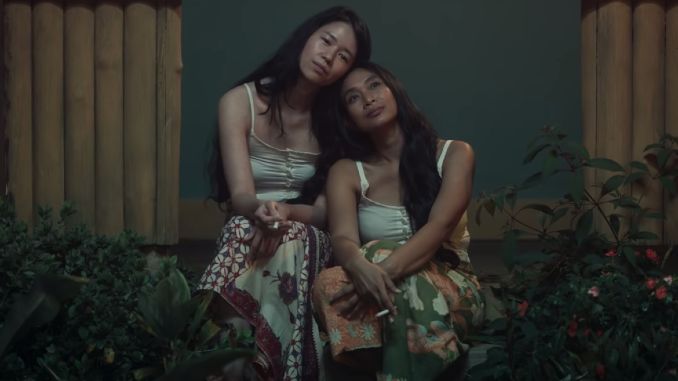In the daydream of life, all we can really hope for is to escape our nightmares – or at least to forget them. Nana (Happy Salma) weaves her way through Bandung in a ’60s Before, Now & Then fugue, haunted by her past and so detached from her present that even her most mundane daily activities feel like they can in the sweltering Indonesian heat vaporize. Such is the reality of a woman in this era, her truths confined to the silent but honest subconscious. Writer/director Kamila Andini, who has explored female independence in a younger and more modern way with Yuni for the past year, adapts Ahda Imran’s biographical Jais Darga Namaku into a stirring vignette about a woman’s checkered, multi-faceted existence as survivor, mother, wife and businesswoman. It is only fitting that Andini finds such richness in a single chapter in the life of his subject: its contemplative complexity is both rending and hopeful, assuring us that it is always possible to go forward – even if we never really leave anything behind .
Nana’s bittersweet marriage to elderly, wealthy plantation owner Darga (Arswendy Bening Swara) is plagued by her memories. She escaped the violence of the Indonesian National Revolution, but her first husband and father were not so lucky. Their fates, as she imagines them, swarm around her body like mosquitoes and play out in pantomime like Apichatpong Weerasethakul’s leaf-covered ghosts. Whether they are dead or simply missing, to Nana they are simply gone. 15 years have passed since their desperate escape from the jungle. Now she’s burdened with several young children, including the charming and inquisitive Dais (Chempa Puteri), while her country is once again mired in violence – this time a genocidal anti-communist coup by Major General Suharto, who takes over as the country’s first president. Sukarno.
But Nana is now willy-nilly separated from all that. She is protected by wealth as she never was in her youth. Your concerns are personal, domestic. The scathing loudmouths at their rich ladies’ lunches are far more threatening to their well-being than the McCarthyist killers their servants whisper about. They’re even more disturbing than Darga’s infidelity, brazen and blatant to the point that his lover, a butcher named Ino (Laura Basuki), doesn’t even bother to wait until Nana is gone to email her invitations Courier to send to the couple’s home. Darga and Ino disregard monogamy and stoke the gossip fires, but Nana is most intrigued by it. She knows her husband, even if she doesn’t like him, but what kind of woman could Ino be?
Her exploration, which leads to an intimate connection that transcends romantic and queer lines with subtle physical closeness, is one of grand style and suppressed emotion. Floral sarong kebaya power struggles on the slender bodies of the upper crust; pounding drums fuel their pose-filled boogaloo dances; Cigarettes, whose smoke is ubiquitous, are shared or extinguished. And almost nobody says what they mean. Andini generally uses little dialogue, relying on Salma’s exquisite eyes. Fleetingly and smugly, they meet or dodge those of the shy Basuki, whose youthful panache explains Darga’s attraction – and Nana’s.
Andini conveys longing in every image, matching Ino and Nana’s outfits (bought by the same man, or do they just share a sense of style?) as they walk them at opposite ends of hallways and corridors or too close at picnics, swimming and Smoking placed breaks. Shades of Wong Kar-wai’s fatal longing and Peter Strickland’s unabashed structural blurring of the strange and the mundane keep her story accessible even as she seeks to indulge her disguised literary inclinations. Nana’s inwardness is so distant at times that it’s frustratingly alienating, especially when the film devolves into scenes with so much logistical gibberish that her place in it all can sink in the excitement. Some events or settings are repeated too often to have any effect, while some hallucinatory sequences lose their impact after their aesthetic calling cards become apparent. As it’s clear we’re only getting part of her life, its connections – to the outside world and to the players in their own corner – beg for the same intimacy as some of the Before, Now & Then images imply. Otherwise, moments like a late tearjerker between Nana and Dais can feel superficial, constructed rather than grown.
But through Salma’s masterful performance, Nana’s psychological unease seems welcoming and empathetic outside of her blurry visions. Her interest in Ino’s outspoken feminism while languishing in the shackles of domesticity reflects the central conflict of Before, Now & Then: that of a country and people, simultaneously stifled and full of life. It’s a state of potentiality, curled up and waiting for the right catalyst to come along and snap it loose. Before, Now & Then looks back on just a life haunted by regrets, memories and possibilities, one that finds a way to move forward thanks to small bonds and an inner steel. Violence, political strife, marital troubles – the world moves on, but Before, Now & Then explores what it takes to get through it all.
Directed by Kamila Andini
Author: Kamila Andini
Cast: Happy Salma, Laura Basuki, Arswendy Bening Swara, Ibnu Jamil, Rieke Diah Pitaloka, Arawinda Kirana, Chempa Puteri
Release Date: October 19, 2022 (Chicago International Film Festival)
Jacob Oller is the film editor at Paste Magazine. Follow him on Twitter at @jacoboller.
Follow @PasteMovies for the latest movie news, reviews, lists and features.


Comments are closed.